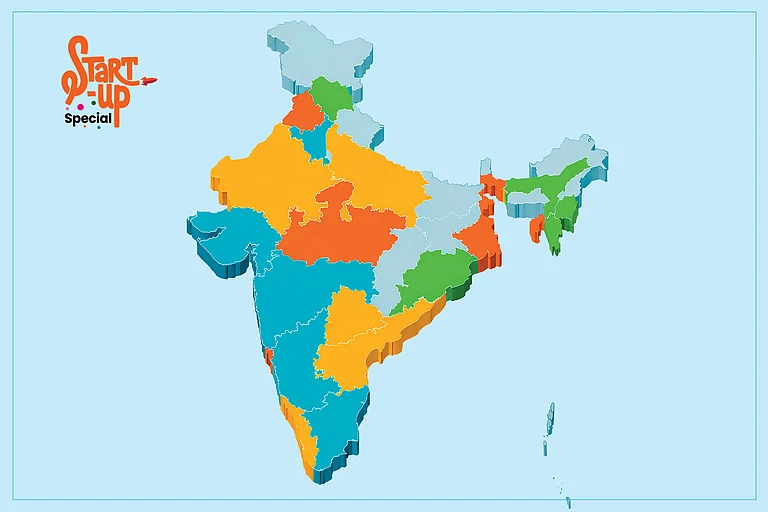AI is everywhere! And India is at the forefront of adopting this technology, exploring and utilising it for multiple use cases. According to Stanford's 2024 AI Index Report, India ranks seventh globally in AI start-up activity growth over the last decade.
OpenAI CEO Sam Altman also applauded India’s AI adoption stating in an X post that “India is outpacing the world” and that whatever is happening with “AI adoption in India right now is amazing to watch.”
Additionally, Just a few days back, in an interview Altman revealed that India is their fastest growing market outside of the US. This means that there is plenty of opportunity for Indian firms to capitalise the technology.
Tech Veterans in AI
A large number of new-age start-ups in India are either solely based on AI or have integrated AI in their business operations in some way. An INC42 report suggests that there are almost 200 GenAI start-ups in India. In 2025 alone, India has seen the creation of 27 AI start-ups.
Surprisingly, the founders of these new age start-ups are not just young entrepreneurs but also seasoned tech innovators and business leaders who are quitting their role in legacy companies to launch AI startups.
The list is extensive and includes some of the country's prominent figures. Among them are CP Gurnani, the former CMD of Tech Mahindra and now co-founder of AlonOS; Sharad Sanghi, the former founder of NetMagic and former MD of NTT India, who is now co-founder of Neysa; Ankur Jain, founder of Jivi AI and former Chief Product Officer at BharatPe; Ashwini Asokan, Co-founder of Mad Street Den and former Mobile Portfolio Manager at Intel Corporation; and Rajiv Srivastava, co-founder of CoreOps.AI and former head of HP India as well as COO of HP Asia Pacific & Japan, among many others.
But Why do they choose to leave a high paying and leadership role in pursuit of AI?
The Rationale
The tech veterans are choosing to venture out in AI because this is the best time. India finds itself at a sweet spot, as its start-up surge aligns with the global AI boom. The country has approximately 8,150 AI start-ups, according to Tracxn data. Among them, around 1,800 have received funding, 449 have secured Series A+ investment and 24 have reached unicorn status.
“The Indian economy has changed from being mostly agrarian to becoming increasingly diversified with a range of sectors. The nation has become an appealing spot for entrepreneurs, both domestic and foreign, owing to improved infrastructure, government assistance, and resource accessibility,” said CP Gurnani, Co-founder and Chief Executive Officer, AIonOS.
Expertise and Experience
A huge chunk of tech leaders are leaving their high paying roles to start their AI ventures because they recognise the potential of this technological breakthrough and are ideally positioned to leverage their expertise and experience to capitalise on it.
Ashwini Asokan, Founder & CEO of Vue.ai described it as a “great time for entrepreneurship.” She said, “Every time there's a leap in technology by a handful, it ushers in a massive unlock for people who have had that training, risk appetite and the ambition to go places very few go. It's the coming together of an early but surely growing market, technology maturity and availability of risk capital. This happens in a cycle every time there's a big breakthrough.”
Talking about the potential of this technology, Gurnani explained how the technology is evolving and continuously “changing the landscape and boosting efficiency & business growth” for startups in India. According to a report by NASSCOM, AI adoption in Indian enterprises and startups has grown at a CAGR of 25-35% over the past few years. AI technologies, particularly LLM & Agentic AI, present a unique opportunity for SMEs to innovate and scale without the traditional constraints of workforce size and unlock new opportunities,” Gurnani said.
Industry Insights
Being in leadership roles of top tech companies provides you with enough information and insights to foresee where the industry is heading. Sharad Sanghi, Co-Founder & CEO, Neysa revealed that his stint at Netmagic gave him the “lens to spot early inflection points.” Similarly, he observed a distinct shift in enterprise demand around the year 2022.
“It was becoming clear that organisations needed infrastructure capable of supporting AI workloads, especially GPU-based compute. In the absence of locally tuned, cost-effective options, many were turning to global hyperscalers, a pattern reminiscent of what played out with data centers two decades ago. At that time, having moved into a global role overseeing data centers, colocation, and cable businesses, it became harder to directly influence cloud service direction,” Sanghi said.
The ability to gauge this opportunity led him to start his own AI venture aimed at solving the problem.
Familiarity to Founder Duties
Tech veterans are already familiar with many of the responsibilities that come with being a founder. They engage in research, lead teams, build projects, and manage crises, these are duties that are fundamentally similar to those of a founder. “I got to work in tech R&D, tech production, user research and the design process of developing something new, the business and revenue angles to launching it, customer engagements and much more in the decade I worked in the valley, with stakeholders across the world, not to mention managing teams across multiple disciplines inside a 100 thousand person organization,” said Asokan while explaining how her previous roles helped in her current venture.
Similarly, Sanghi described that his tech role offered a “front-row seat to how large-scale infrastructure intersects with evolving technologies including cloud, edge, AI and the operational complexities.”
That experience shaped his understanding of what it takes to scale innovation reliably and securely. “With Neysa, the pattern feels familiar but it’s moving 10x faster,” he said.
































